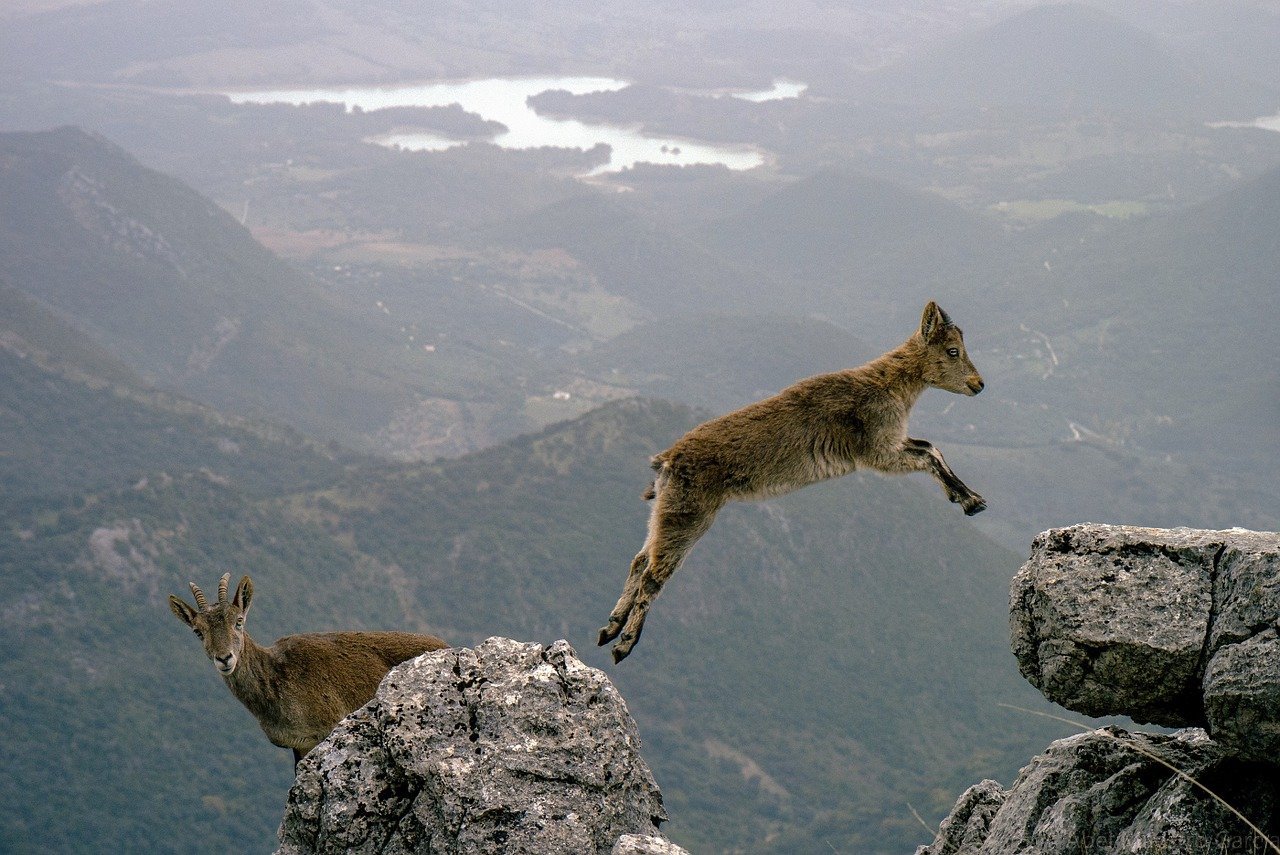In a recent post we started looking at more precise vocabulary for expressing different types of movement related to the very general verbs walk and run. Let’s look at other verbs of movement, this time focusing on the general concepts jump and fall. As always, we’ll talk about both meaning and usage, with loads of examples to help you make sense.
Ways of Jumping
To jump is a very common verb that can be used with people, animals, and pretty much anything else that can put itself into the air for a moment.
- The kids are jumping up and down on the bed.
- Our cat can jump from the floor onto the top of the refrigerator.
- The horse jumped over the fence.
To jump for joy is an expression that means that you’re so happy you jump into the air. To make someone jump means to scare them. To jump out of your skin also means to be very scared by something sudden and unexpected.
- We jumped for joy when we heard the good news.
- You made me jump! I didn’t see you standing there!
- Frank nearly jumped out of his skin when he saw the snake.
To leap is very similar to jump, but it has a sense of reaching for something, or jumping with beauty and elegance. You can say that a horse jumps, or if you really want to convey a sense of graceful movement, say that it leaps. Leaping also conveys a sense of height or distance. So a leap is a jump that’s longer or higher than usual, and also graceful.
- The ballet dancers leapt into the air with such grace and elegance.
- When the deer saw our car, it leapt away into the forest.
- We saw dolphins leaping out of the water around our boat. It was beautiful!
- The monkey leapt from one branch to another.
To hop is to jump, but it’s usually shorter and not very high, and there’s not much of a sense of elegance. Gazelles and ballet dancers leap, but frogs hop. People can hop, too, usually children, and there’s a sense of playfulness.
- The frog hopped off the rock into the water.
- I hopped off the beach because the sand was so hot and it hurt my feet!
- The child hopped up onto the chair.
To spring is also to jump, but it conveys a quick and sudden kind of jump, for instance when you need to quickly get out of the way of something to escape danger. The expression to spring into action means to jump up and move at a moment’s notice.
- The farmer sprang out of the way of the charging bull just in time.
- The deer sprang out of the road when it saw the car coming.
- Firefighters spring into action the moment they hear the alarm.
To skip is to jump while you’re running in a playful and carefree way. Children skip when they’re happy; they take long jumping steps and move their hands back and forth. To skip (something) means to not do it, to figuratively jump over it.
- Jenny was excited about her birthday party, so she skipped all the way home.
- The kids were skipping happily around the playground.
- I skipped work today because I felt a bit sick.
Ways of Falling
To fall is the most basic and general verb that describes moving from high to low, by gravity.
- Leaves are falling from the trees.
- When I was a child, I fell off a horse and broke my arm.
- The cat fell from a third story window, but she didn’t get hurt at all.
There are a few common expressions and phrasal verbs that use to fall: to fall asleep (to enter a state of sleep), to fall in love (to start loving someone), to fall through the cracks (to be forgotten, to be missed as part of a procedure), to fall apart (to enter a state of disrepair, to be in a state of poor maintenance), to fall through (to not happen, as in plans), to fall short (to not have or be enough), to fall into debt (to enter a state of owing money)…
- I got in bed at 11:30 but didn’t fall asleep until around 1am.
- Dan said he fell in love with Sarah the first time he saw her.
- We forgot to pay this bill! It must have fallen through the cracks.
- Our house is very old and in very bad shape. It’s really falling apart.
- Jerry’s plans to drive to the country this weekend fell through because of the snowstorm.
- We did our best, but unfortunately we fell short.
- After Mike lost his job, he quickly fell into debt because he had no savings.
To trip is to fall because you accidentally step into something that you don’t see. You can trip on or trip over something.
- Someone left a big box on the sidewalk, and I didn’t see it and tripped over it.
- The dog is always sleeping in the middle of the hall, so we always trip over him.
- Be careful! Your shoelaces are untied. Don’t trip on them!
To stumble over something is to trip over it, but if you stumble, you don’t necessarily fall. To stumble also means to walk in a very awkward way, almost falling with each step that you take. People stumble when they’re tired, or seriously injured, or drunk.
- I stumbled over someone’s shoes that were left lying in the middle of the room.
- I stumble out of bed every morning and immediately make a cup of coffee!
- What time did you stumble out of the bar and go home last night? You look awful this morning!
To slip is to lose your footing – to stumble and almost fall – because you walked on something slippery, like ice, or something wet, or the proverbial banana peel.
- I slipped on ice walking up the stairs outside and really hurt myself.
- Don’t run on the floors! They’re wet, and you’ll slip.
- Has anyone really ever slipped on a banana peel?
To slide is similar to slip, but to slip means to (almost) fall, while to slide simply means to lose control of your movement because of a slippery surface.
- My car slid off the road in the snowstorm.
- I don’t ski. The thought of sliding down a mountain over snow and ice terrifies me!
- All of the glasses and bottle slid onto the floor during the earthquake. What a mess!
To tumble is to fall in bouncing movement. For example, while you may fall from a tree, you probably tumble down a hillside, because you come into and out of contact with the hill as you fall.
- I tumbled down a pretty steep hill while we were hiking, but I didn’t get too hurt.
- Huge rocks came tumbling down the mountainside and almost hit our car.
- Clothes tumble around in a clothes drier as they dry.
When something round or cylindrical moves over a surface because of gravity or a push, that’s to roll. Wheels roll, logs roll, a ball or an orange may roll.
- I forgot to put the emergency brake on in my car, and it rolled down the hill.
- Denise rolled the ball across the lawn to her daughter.
- That suitcase has wheels. If it’s too heavy to lift, just roll it.
Learn English with the Language Garage!
If you’re interested in ESL/EFL lessons, please check out our English courses. We have private lessons, lessons for you and a friend or colleague, or small groups. Or see our other posts on English grammar, vocabulary, and more.




